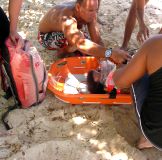ADVANCED EMERGENCY CARE
Advanced Emergency care (1.5 Day course)
- Provide enhanced life support
- Provide comprehensive emergency care
- Manage a crisis in emergency situations
- Provide cardio pulmonary resuscitation, mouth to mouth, bag mask, oxygen therapy equipment, positioning of the patient, major haemorrhage control.
- Assess a patient; demonstrate knowledge of shock advisory defibrillation; administer direct current (DC) shock; provide aftercare of a resuscitated patient; and provide aftercare of a deceased patient.
Introduction
This Course re-enforces the skills gained at Intermediate Emergency care whilst learning of the physiology of defibrillation as well as essential associated practical defibrillating skills. Advanced Emergency Care lifts the competency of the participants to a much higher skill expectation. All training on this course is tailored to the clients specific environment and may also be based around health and safety historical data. It is encouraged that clients base this courses on site to obtain the full benefit of this course.
SESSION OBJECTIVES:
By the end of this session the participants will rapidly recognize situations where emergency care is essential and provide advanced life support in off site environments including:
- Scene Management, Site survey & Triage
- Ascertain information from Patient Assessment and base line recordings and act accordingly
- Understand Kinetics of Trauma as a diagnostic tool
- Dive emergencies
- Metered Dose Inhalers
- Acute Chest pain& Aspirin
- Advanced Cardiology
- Early Defibrillation
- Chain of survival
- Defibrillation practice
- Special situations
- Oxygen Therapy and management including Defibrillation
- Pediatric life support
- Air Way Management
- Administering airways by laryngoscope
- Chest trauma management
- IV Cannulation
- Easy IO Intraosseous infusion
- Emergency Orthopedics
- Long Bone fracture management
- Scenario exercises incorporating ABCD techniques
DURING THIS SESSION PARTICIPANTS WILL ALSO:
- Become familiar with Trauma care methods designed to manage complicated emergency situations.
- Identify the need for quick ABCD assistance for a heart attack victim
- Be able to link emergency care with the necessity to manage a crisis with efficiency to minimize further trauma.
- Incorporate specialized emergency equipment into their emergency care skill base and training programs
- See the importance of linking all training in emergency care with relevant risk management and safety procedures currently in operation within the work place.




